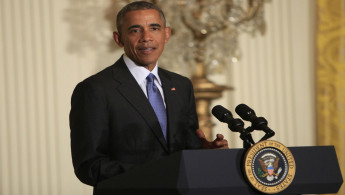Obama vows increased efforts against IS in Libya
President Barack Obama on Thursday said the United States would tackle the Islamic State group beyond Iraq and Syria if necessary, as he signalled an increased focus on Libya.
Amid fears that a power vacuum in the North African nation has provided fertile ground for the Islamic State group (IS) to grow so close to European shores, Obama convened his National Security Council to discuss the issue.
"The President emphasised that the United States will continue to counter ISIL terrorist plotters in any country where it is necessary," the White House said using and acronym for IS following the meeting.
"The President directed his national security team to continue efforts to strengthen governance and support ongoing counterterrorism efforts in Libya and other countries where ISIL has sought to establish a presence."
On Wednesday, Pentagon press secretary Peter Cook said the US is weighing military options against IS in Libya.
"We're looking at military options, a range of other options as... the situation in Libya unfolds," Cook said.
"We want to be prepared, as the Department of Defence always wants to be prepared, in the event that ISIL in Libya becomes more of a threat than it is even today."
In December, the Pentagon acknowledged that a group of US special operations troops who had travelled to Libya to "foster relationships" was kicked out of the conflict-torn country soon after they arrived.
Additionally, the United States has already taken some action in Libya.
In November, it launched an airstrike killing top IS leader Abu Nabil, an Iraqi also known as Wissam Najm Abd Zayd al-Zubaydi.
Libya has been in political turmoil and rocked by violence since the ousting of longtime dictator Muammar Gaddafi in a 2011 revolution.
It now has two governments and parliaments, with the recognised authorities based in the eastern city of Tobruk and a militia-backed authority in Tripoli.
The Islamic State group has exploited the turmoil in Libya to expand its influence in the country and attack key oil facilities.
The group first appeared in the North African nation in 2014 and has since claimed responsibility for beheadings and suicide bombings.
IS has established a stronghold in the coastal city of Sirte, Gaddafi's hometown, and is reported to have at least 3,000 fighters in Libya.





 Follow the Middle East's top stories in English at The New Arab on Google News
Follow the Middle East's top stories in English at The New Arab on Google News
![The UAE is widely suspected of arming the RSF militia [Getty]](/sites/default/files/styles/image_330x185/public/2024-11/GettyImages-472529908.jpg?h=69f2b9d0&itok=Yauw3YTG)
![Netanyahu furiously denounced the ICC [Getty]](/sites/default/files/styles/image_330x185/public/2024-11/GettyImages-2169352575.jpg?h=199d8c1f&itok=-vRiruf5)
![Both Hamas and the Palestinian Authority welcomed the ICC arrest warrants [Getty]](/sites/default/files/styles/image_330x185/public/2024-11/GettyImages-2178351173.jpg?h=199d8c1f&itok=TV858iVg)